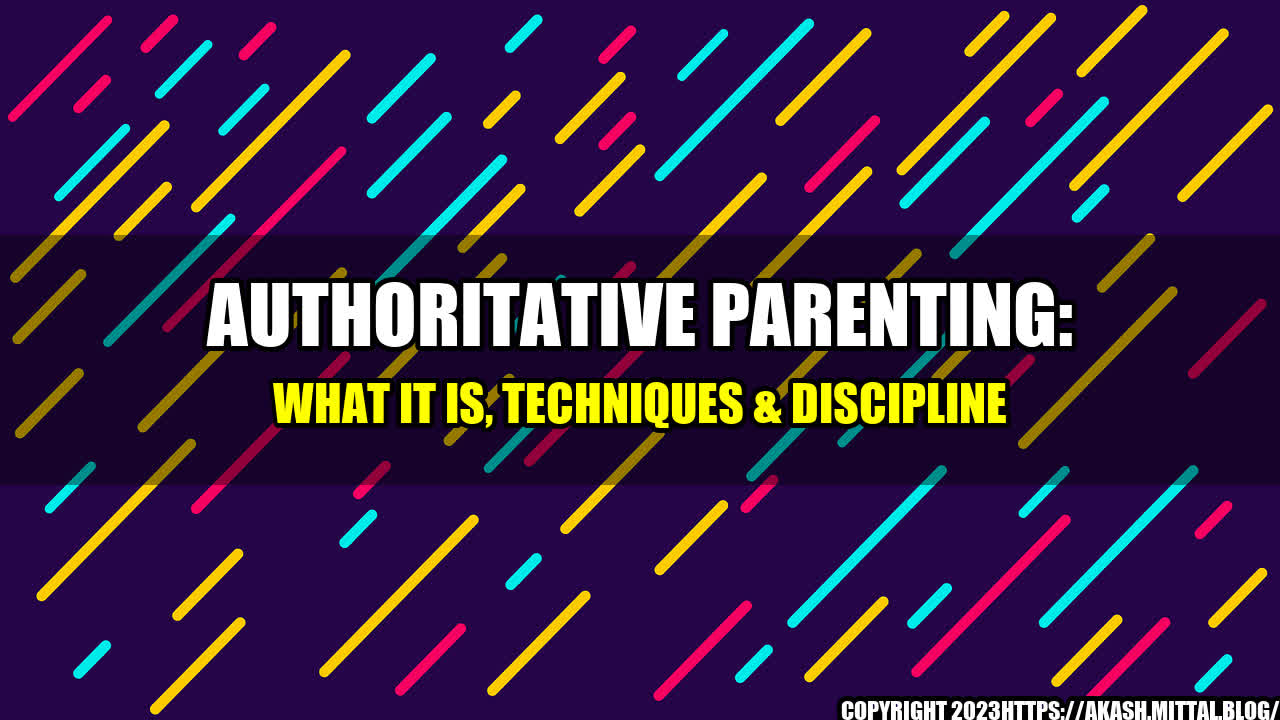Do you remember the time when you were a teenager and wanted to try out new things, but your parents wouldn't let you? Or perhaps you recall when your sibling got into trouble for not following the rules, but you were treated differently when you did the same thing? These are examples of inconsistent parenting, which can lead to confusion and resentment in children. On the other hand, there is a parenting style that balances firmness and warmth, structure and flexibility, and high expectations and support. It's called authoritative parenting, and it can benefit both parents and children.
According to a study by the University of California, Berkeley, authoritative parents tend to raise children who are independent, self-reliant, socially responsible, and academically successful. This is because authoritative parenting involves clear communication, mutual respect, negotiation, and monitoring. Unlike authoritarian parenting, which is strict and punitive, or permissive parenting, which is lax and indulgent, authoritative parenting seeks to create a positive environment where children can learn from their mistakes, develop their skills, and express themselves.
Techniques of Authoritative Parenting
How can you practice authoritative parenting in your own family? Here are some techniques to consider:
- Establish clear rules and consequences. Consistency is key to authoritative parenting, so make sure your children understand what is expected of them and what will happen if they break the rules. Be specific, reasonable, and age-appropriate, and avoid using physical or verbal punishment as it can harm your relationship with your children and undermine their self-esteem.
- Show empathy and validation. Authoritative parents listen to their children's feelings, perspectives, and needs, and respond with empathy and validation. This doesn't mean agreeing with everything your children say or do, but rather acknowledging their emotions and point of view. By doing so, you can build trust, closeness, and confidence with your children, and prevent misunderstandings and conflicts.
- Encourage autonomy and responsibility. Authoritative parents encourage their children to make decisions, solve problems, and take responsibility for their actions. This helps children develop a sense of competence, independence, and accountability, and prepares them for adult life. However, be mindful of giving your children too much or too little freedom, and provide guidance and support when necessary.
- Offer praise and feedback. Authoritative parents praise their children for their efforts, progress, and achievements, and provide constructive feedback that helps them learn and improve. This fosters a growth mindset, where children see mistakes as opportunities for growth, rather than failures to be ashamed of. Moreover, it reinforces positive behaviors and self-worth, and motivates children to continue their good work.
- Spend quality time together. Authoritative parents value the relationship with their children and prioritize spending quality time together. This can take various forms, such as having meals, playing games, reading books, doing hobbies, or simply talking. By doing so, you can strengthen the emotional bond with your children, boost their self-esteem, and create positive memories that last a lifetime.
Discipline in Authoritative Parenting
Discipline is an integral part of authoritative parenting, but it's not synonymous with punishment. Instead, discipline means teaching children how to behave appropriately, and guiding them to learn from their mistakes. Here are some principles of discipline in authoritative parenting:
- Use logical consequences. Logical consequences are consequences that are related to the misbehavior, and teach children the natural or logical consequence of their actions. For example, if your child forgets to do their homework, they may have to do extra chores instead of watching TV.
- Explain the reason for the rule. Authoritative parents explain to their children why a rule is in place, and how it benefits them and others. By doing so, they help their children understand the rationale behind the rule, and internalize the value of following it.
- Involve children in problem-solving. Authoritative parents involve their children in finding solutions to problems, and give them a voice in the decision-making process. By doing so, they show respect and trust for their children's abilities, and promote their problem-solving and critical thinking skills.
- Offer praise and recognition for good behavior. Authoritative parents reinforce positive behavior by offering praise and recognition for good behavior. By doing so, they motivate their children to continue their good work, and reinforce the value of following the rules and behaving respectfully.
Conclusion
In conclusion, authoritative parenting is a style that balances warmth and discipline, and seeks to create a positive and supportive environment for children. By practicing authoritative parenting, you can raise resilient and responsible children who are capable of navigating challenges and succeeding in life. Here are three key takeaway points:
- Authoritative parenting combines firmness and warmth, structure and flexibility, and high expectations and support.
- Authoritative parenting involves clear communication, mutual respect, negotiation, and monitoring, and seeks to create a positive environment where children can learn from their mistakes, develop their skills, and express themselves.
- Authoritative parenting can benefit both parents and children, by promoting positive relationships, emotional health, and academic and social success.
Remember, parenting is a journey, not a destination. You can always learn and improve your parenting skills, and adapt them to the changing needs of your children and family. With authoritative parenting, you can create a family that thrives and grows in love and harmony.

Curated by Team Akash.Mittal.Blog
Share on Twitter Share on LinkedIn